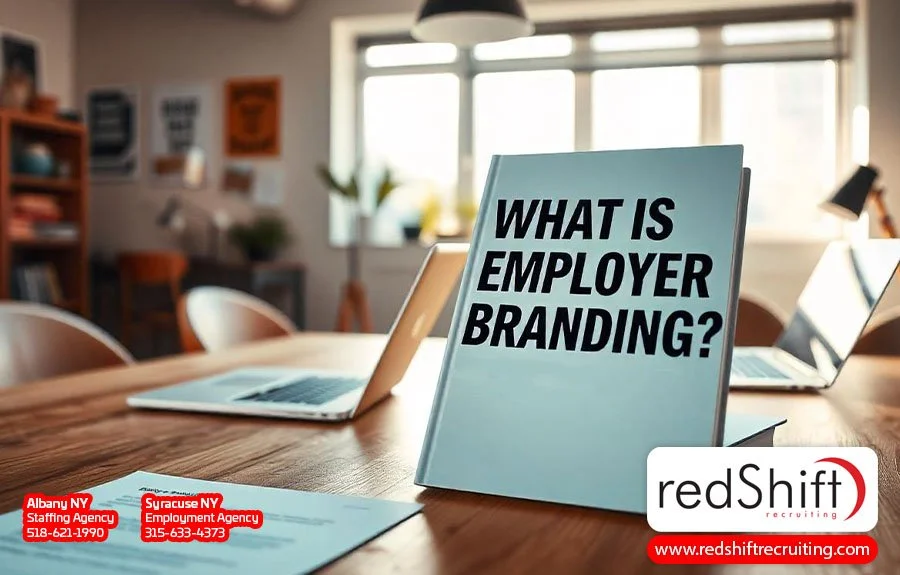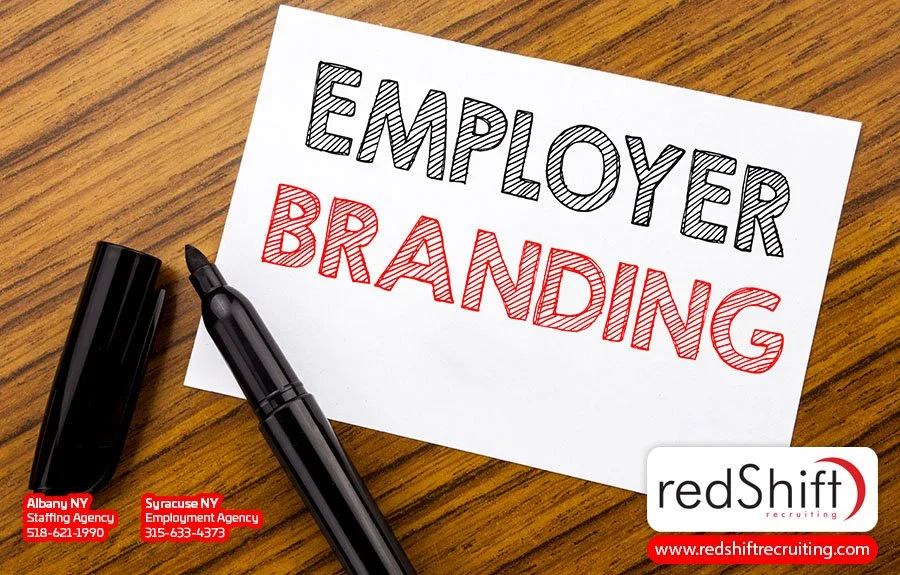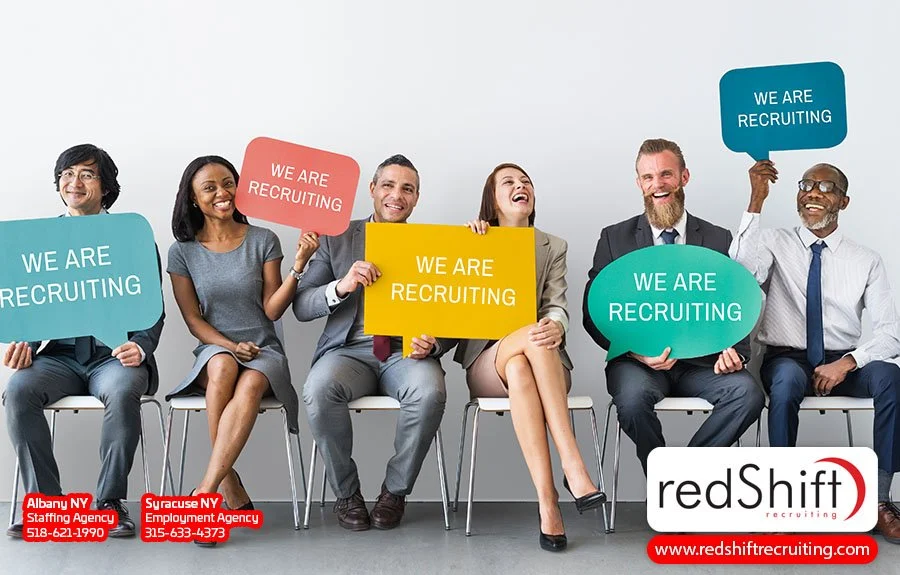What Is Employer Branding and How Can It Help You Hire?

Have you ever considered the power of perception when it comes to attracting top talent to your organization? Think about the last time you were job hunting. What made certain companies stand out as places you'd love to work? Chances are, those companies had strong employer brands. But what is employer branding, and why does it matter? Simply put, it's how your company is perceived as a place to work. The reputation and image your company projects as an employer could be the magnet that pulls top talent your way or the barrier that keeps them at arm's length. This article will break down the concept of employer branding, highlighting its crucial role in your recruitment strategy, and providing practical tips for crafting a brand that resonates with the candidates you want to attract.
What Is Employer Branding?
Employer branding refers to the way your business is perceived as a workplace by both current employees and job seekers. It’s essentially the image or identity you project as an employer, including everything from your company's reputation and work environment to how you treat your employees. A strong employer brand will effectively highlight your company values, work culture, and the benefits of working with your organization.
There are several factors that contribute to your overall image as an employer. These include online reviews on platforms like Glassdoor, the content and messaging on your career page, and the overall experience candidates have during the hiring process. Even small details, like interactions during interviews or how your employees talk about your company on social media, help shape how your employer brand is perceived.
Although they are related, your employer brand differs from your overall company brand. Whereas company branding focuses on how your business is viewed by customers or the general public, employer branding zeroes in on how you're perceived as an employer. It defines the experience potential employees expect and speaks directly to your employer value proposition (EVP), which is the unique set of benefits, growth opportunities, and workplace culture that make your company an appealing place to work. While the EVP outlines what you offer to employees, your employer brand reflects how job seekers perceive those offerings. A strong employer brand not only attracts top talent but also retains current employees by fostering a positive work environment.
Managing your reputation is an important part of maintaining a strong employer brand. Online reviews, word-of-mouth, and employee advocacy can significantly enhance or detract from your company's reputation as a desirable place to work. Negative reviews or poor experiences can hurt your brand, while positive stories can attract top talent. Actively managing your reputation through consistent, transparent communication with employees and candidates is key to maintaining a strong employer brand.
An effective employer brand is rooted in authenticity. It’s about making sure your external image aligns with what your employees experience internally and providing all of your employees with a supportive and inclusive workplace. While the primary focus is on talent attraction, the ripple effects can extend to increased employee engagement and retention, making it a powerful tool not just for hiring but for long-term organizational growth.

The Benefits of a Strong Employer Brand
A positive employer brand is a powerful tool for recruiting and retaining top talent. So why is employer branding important? Here’s how it can benefit your business:
Attracting Top Talent
One of the most significant advantages of a strong employer brand is its ability to draw the most qualified candidates by showcasing your company as a desirable place to work. When your company is known for offering a great work environment and aligning with employee values, potential candidates are more likely to apply. This makes your business stand out from other employers in a competitive market.
Improving Candidate Quality
When your brand is clear and consistent, you don’t just attract more candidates; you attract the right ones. Job seekers who resonate with your company mission and values are more likely to fit culturally and stay long-term, making the recruitment process more efficient and effective. This also means hiring managers will spend less time filtering out unsuitable candidates.
Reducing Time-to-Hire
A strong employer brand shortens the hiring process. When candidates are already familiar with your reputation, they’re more likely to apply knowing what your company stands for. This reduces the need for lengthy explanations during the interview phase, helping you fill roles more quickly and efficiently.
Enhancing the Job Application Process
A cohesive employer brand improves the entire experience for applicants, from job descriptions to your interactions on social media platforms. Candidates will have a better idea of what to expect from the application process, making them more likely to engage with your company and apply for positions.
Fostering Employee Engagement and Retention
A strong employer brand doesn’t just help you bring in new talent; it also helps you keep your current superstars. Employees who feel connected to your company mission and values are more engaged and likely to stay long-term, while providing flexible working arrangements and fostering a positive work culture also helps boost employee experience and retain talent.
Employee Advocacy
Satisfied employees are your best advocates. When your team feels valued and supported, they’re more likely to share it with others, both online and offline. Whether it's through social media platforms or in everyday conversations, this type of employee advocacy strengthens your employer brand, attracting potential candidates through word-of-mouth and organic recommendations, which are often more persuasive than traditional advertising.
Cultural Fit and Cost Efficiency
By promoting your brand authentically, you’re more likely to attract candidates who align with your company culture. This results in smoother onboarding and long-term engagement, while lowering your overall hiring costs by reducing turnover and costly recruitment efforts.
Enhancing the Corporate Brand
Your employer brand doesn’t just impact hiring; it can also improve your corporate brand. When employees feel satisfied and engaged, they’re more likely to speak positively about your company to customers, partners, and the wider public, helping to enhance your overall reputation.
Ultimately, the long-term rewards of investing in your employer brand are numerous, from attracting top talent and improving retention to creating a more efficient and cost-effective hiring strategy.

How to Build a Strong Employer Brand
Building a strong employer brand takes time and intention. The following are some key steps to help you shape an employer branding strategy that resonates with both your current team and future new hires:
Assess Your Current Employer Brand
Start by taking a good look at your existing employer brand. This involves gathering feedback from your existing employees through surveys or employee interviews to understand what’s working and what needs improvement. What do they value about working for your company? What areas could be improved? Understanding where you stand will help you identify strengths and areas for growth, so you can align your branding with the reality of your workplace.
Define Your Company's Culture and Values
A strong company culture is at the heart of every successful employer brand. Clearly define what your company stands for and how it operates. Be sure your company values are well understood and embraced internally before promoting them externally. A consistent message about your culture helps attract candidates who align with your company’s values.
Create a Compelling Employer Value Proposition (EVP)
Your employer value proposition (EVP) is what sets your company apart in the job market. It’s the unique mix of qualities and benefits that show candidates why your company is the right place for them. To be effective, your EVP needs to authentically reflect your employee value proposition—the real benefits, growth opportunities, and experiences that your employees enjoy every day. When these two are aligned, it creates a consistent and believable message. Make sure your EVP is central to your employer branding materials and is woven into every touchpoint, so candidates understand exactly what makes your company a great place to work.
Leverage Your Company's Unique Selling Points
Identify what makes your business special, whether it’s your approach to flexible work, professional development opportunities, or workplace culture. The company's unique attributes should be highlighted in your branding, from your website to job ads and interviews. This will set you apart from competitors and draw in candidates who are excited by what you have to offer.
Tell Your Company Story
People connect with stories, so use storytelling to bring your brand to life. Share employee stories, testimonials, and success stories across your company blog, social media channels, and internal newsletters. Highlight your values, culture, and what it’s like to work at your organization. Authentic, engaging content can humanize your brand and make it more relatable. Additionally, encourage employee advocacy by having current employees share their experiences on platforms like LinkedIn and Glassdoor, helping amplify your brand’s reach and credibility.
Optimize Your Digital Presence
Your career page and LinkedIn company page are often the first places potential employees visit, so make sure they reflect your employer brand effectively. Use relevant keywords and SEO best practices to ensure they’re easy to find. It's also important to maintain consistent messaging across all platforms, including social media channels, job postings, and your website, to reinforce your brand identity.
Integrate Digital Marketing Strategies
Your employer brand should be part of your broader digital marketing strategy. Regularly update your company blog with relevant content that showcases your culture, company news, and work environment. Keep your career page optimized for search engines, and use your social media channels to consistently engage with potential candidates and promote job openings.
By following these steps, you can build an authentic, engaging employer brand that not only attracts top talent but also keeps your existing team motivated and loyal.
Measuring the Effectiveness of Employer Branding
To know if your employer branding efforts are working, you need to track measurable outcomes. Start by conducting an employer brand audit to review how your brand is perceived by both current employees and potential employees. Employee surveys, feedback loops, and exit interviews offer valuable insights into how well your employer brand resonates internally. They measure employee satisfaction, engagement, and their overall experience at the company. Feedback from both internal employees and former team members will help you assess whether your branding reflects the actual employee experience, helping you spot any gaps between perception and reality. For example, if surveys reveal that high turnover rates stem from employees feeling limited in their career development or overwhelmed by their workload, you may revise the job descriptions to more accurately reflect the role or offer additional growth opportunities and work-life balance options to better meet their needs and expectations. Gathering feedback on the candidate experience throughout the recruitment process can also help assess whether your brand messaging matches the actual hiring experience. Addressing these insights is an important part of the employer branding process and can improve employee retention by enhancing loyalty, productivity, workplace culture, and overall job satisfaction.
Key performance indicators (KPIs) like applicant quality and quantity also provide a clear measure of success. A powerful employer brand attracts more qualified candidates, making the recruitment process faster and smoother. Tracking time-to-hire is another helpful metric, as a strong brand typically shortens hiring cycles by drawing candidates already familiar with your company. Monitoring turnover rates is equally important, as a drop in turnover signals that your employees are engaged and satisfied, while a high turnover rate could indicate a disconnect between your brand’s external image and the actual work environment. Cost per hire is another valuable measure, since a strong employer brand often translates into lower recruitment costs by naturally attracting candidates and reducing the need for costly headhunting.
Online presence matters too. Analyzing engagement with your employer branding content on social media or review sites like Glassdoor or LinkedIn offers insight into how your brand is received externally. Look at reviews, comments, and interactions to gauge how current and former employees view your company. Your marketing team can help track these metrics to refine your branding strategy.
Finally, ensure your employer branding is both authentic and inclusive. This is not only more appealing to job seekers but also helps avoid potential legal and ethical issues. By regularly measuring these factors, you can keep your employer branding process aligned with your values and continuously improve its effectiveness.

Frequently Asked Questions
What Is the Difference Between Employer Branding and Company Branding?
While employer branding focuses on how your company is perceived as a workplace by both employees and candidates, company branding targets the overall public perception of your business, including customers and clients. Employer branding zeroes in on what makes your company attractive as an employer, such as work culture, values, and career opportunities, while company branding covers your products, services, and customer-facing identity. Understanding the distinction helps ensure that your messaging remains consistent but tailored to each audience.
How Long Does It Take to Build a Strong Employer Brand?
Building a strong employer brand is an ongoing process that can take several months to a few years, depending on your starting point and the resources you invest. It’s not a quick fix—creating a genuine, powerful employer brand requires consistent effort, including gathering feedback from employees, refining your messaging, and aligning your internal culture with your external reputation. Factors like the size of your company, industry competition, and how quickly you can implement changes also impact the timeline. Patience and regular evaluation are key to ensuring your employer branding efforts are sustainable and effective.
What Metrics Should I Track to Measure the Effectiveness of My Employer Branding Efforts?
To measure the success of your employer branding efforts, focus on metrics like the quality and quantity of job applicants, time-to-hire, and employee retention rates. Additionally, track engagement on your social media channels, reviews on job sites, and feedback from candidates on their application experience. Monitoring these metrics over time will show whether your branding efforts are attracting top talent and keeping your employees satisfied.
How Can I Address Negative Feedback About My Company’s Employer Brand?
Negative feedback can be disheartening, but it's also a valuable opportunity to improve your employer brand. Start by addressing the concerns raised—whether through public responses on review platforms or internal action to resolve issues. Openly communicate with employees and candidates about how the company is working to improve, showing a commitment to growth and transparency. By acting on feedback and being proactive, you can turn negative perceptions into positive ones.
What Role Does Social Media Play in Enhancing Employer Branding Efforts?
Social media is a key tool for enhancing your employer brand because it allows you to reach a wide audience and share authentic stories about your company culture. Platforms like LinkedIn, Instagram, and X (Twitter) can showcase employee testimonials, company events, and community involvement. By consistently engaging with your audience and sharing content that highlights your values and workplace environment, you can create a strong, approachable brand presence that resonates with potential candidates.
How Can Small Businesses or Startups Build Employer Brand With Limited Resources?
Small businesses and startups can build strong employer brands by focusing on their unique strengths and values, even with limited resources. Highlight your company's culture, mission, employee benefits, and any perks that set you apart, such as flexibility or growth opportunities. Use free or low-cost tools like social media, your company blog, and employee testimonials to showcase what makes your workplace special. Engaging with potential candidates through authentic content and creating a positive employee experience will help build a reputation that attracts talent, even without a large budget. Consistency and creativity are key to standing out.
Conclusion
In the grand scheme of running a business, employer branding might seem like a 'nice to have' rather than a necessity. But in today's talent market, a strong employer brand can be your secret weapon. It's the magnet that draws in top talent, the glue that keeps your best employees, and the beacon that guides your company culture and illuminates your overall reputation. By strategically investing in your employer brand, you're not just making hiring easier—you're laying the groundwork for long-term organizational success. So, take a hard look at how your company is perceived as an employer. Are you the workplace of choice in your industry? If not, it's time to roll up your sleeves and get to work on your employer brand. The effort you put in today will pay off in a stronger, more capable workforce tomorrow.


Article Author:
Ashley Meyer
Digital Marketing Strategist
Albany, NY
from Career Blog: Resources for Building a Career - redShift Recruiting https://www.redshiftrecruiting.com/career-blog/what-is-employer-branding
via redShift Recruiting

Comments
Post a Comment